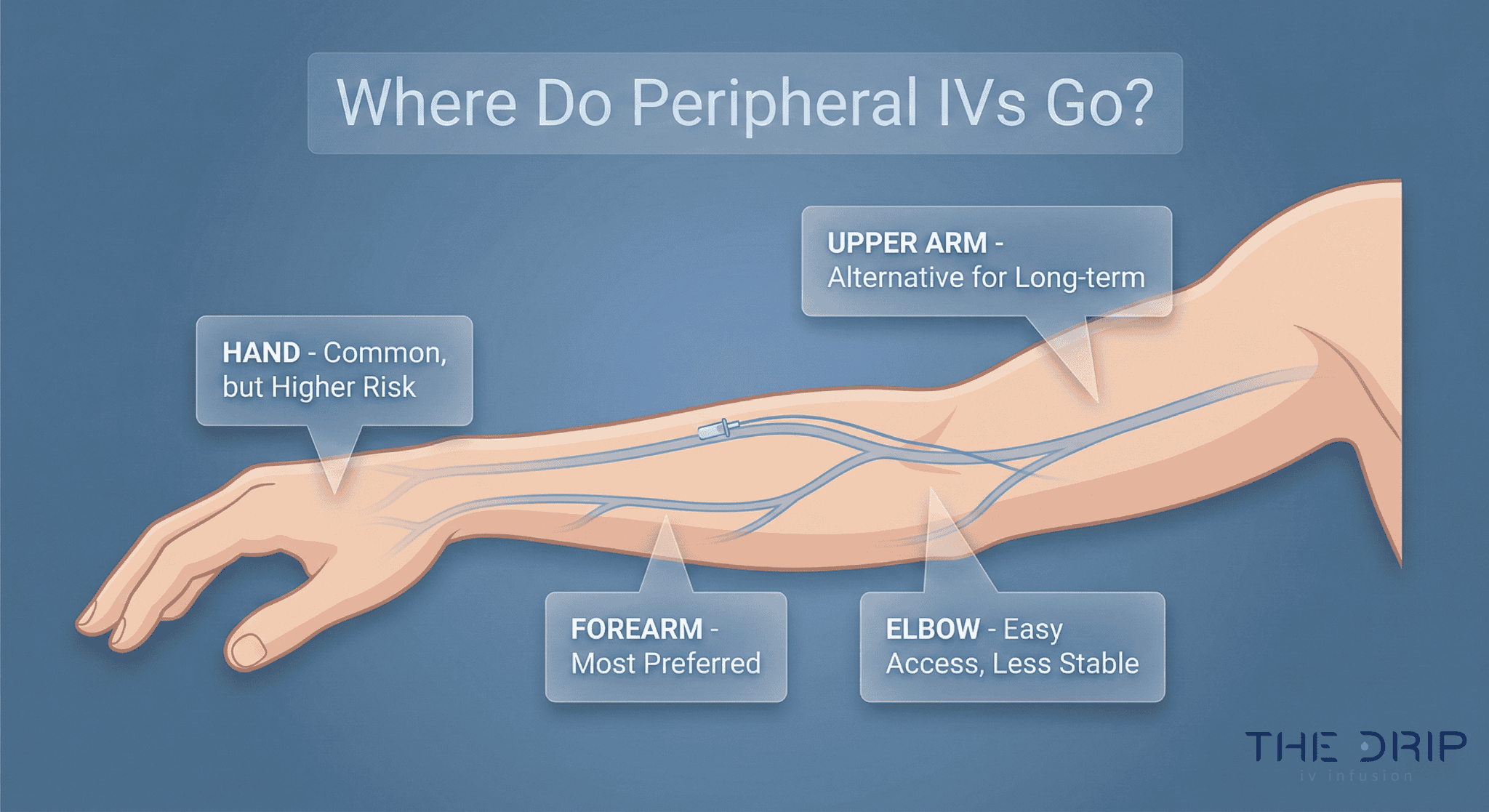Intravenous therapy (IV) is a crucial aspect of modern healthcare. It involves an efficient and rapid delivery of nutrients, medications, and other fluids directly into the patient’s bloodstream for a faster recovery. But who can administer IV therapy?
The administration of IV therapy requires specific training and expertise. In this post, you will learn about the licensed professionals who can give IV treatment and explore the importance of proper qualifications.

Source: shutterstock.com / Photo Contributor: Andrey_Popov
The Convenience of IV Therapy
IV therapy is a convenient healthcare service, providing hydration and necessary nutrients into a patient’s bloodstream, enabling individuals to get personalized treatments without visiting a medical facility.
IV therapy may suit individuals seeking relief from dehydration, fatigue, migraines, and immune system deficiencies. The medications and nutrients that the IV therapy may offer bypass the digestive system, enabling quick absorption.
This may lead to faster results and improved overall well-being. For those needing mobile IV therapy Queen Creek AZ, nurses from the Drip IV Infusion can provide a reliable solution for revitalizing their health.
Those with busy schedules and limited mobility can experience the benefit of mobile IV therapy by receiving treatment in their homes or preferred locations. IV therapy is not a very invasive procedure. Its effects may last from a few days up to several weeks, depending on the specific treatment.
So, who can do IV therapy? In continuation, we will discuss licensed personnel for all different types of IV therapy administration and their responsibilities.
Who Can Administer IV Therapy? – Understanding Roles and Qualifications
IV therapy is implemented in various medical settings, such as hospitals, outpatient clinics, and in-home healthcare. That said, the administration of this type of therapy is not a task that anyone can undertake.
It requires extensive knowledge, skills, specific training, and licensing. The healthcare nurse administering the IV must assess the patient’s medical history, conduct a suitable treatment, and focus on the patient’s safety.
So, who is qualified to perform IV therapy? Let’s get into the details.
Registered Nurses (RNs)
Registered nurses are healthcare professionals with a broad scope of practice and are caregivers of IV therapy. These extensively trained healthcare professionals undergo specialized training in IV therapy techniques.
Aside from necessary licenses and certifications to practice nursing, RNs may need to complete an accredited intravenous therapy course during their studies. Such a course covers the principles of IV therapy and administration techniques.
Some states also require nurses to obtain a specific certification for IV therapy, which involves passing an exam and gaining hands-on clinical experience. The registered nurses are proficient in selecting appropriate veins.
They are responsible for preparing the area of IV administration and safely inserting IV catheters. They monitor patients during infusion and are trained to recognize and respond to any adverse reactions that may arise during the procedure.
Infusion Nurses (IN)
Although their scope of responsibilities often overlaps, registered and infusion nurses differ in their roles. While all infusion nurses are registered nurses, not all registered nurses are infusion nurses.
An infusion nurse is a specialized nurse with additional training and expertise in administering fluids via IV therapy. They focus on administering IV treatments, including medications, nutrients, and fluids.
These specialists are highly skilled in selecting appropriate IV access and monitoring the patients throughout the treatment. They administer IV devices and medications in hospitals, clinics, and private settings.
Infusion nurses must complete an accredited nursing program and undergo specialized knowledge and training beyond the standard education that RNs receive.
They need a combination of education, training, and certification to administer therapy safely and effectively. Many healthcare facilities and organizations offer specific certification programs regarding IV treatment.
These certifications include:
Certified Registered Nurse Infusion (CRNI)
Certified Intravenous Therapy Nurse (CRN)
Vascular Access Board Certified (VA-BC)

Source: shutterstock.com / Photo Contributor: Mr.lulai
Licensed Practical Nurses (LPNs)
Licensed practical nurses provide primary nursing care. They can administer IV therapy under the supervision of a registered nurse and are authorized to perform specific tasks related to IV administration.
They include inserting peripheral IV catheters and monitoring patients during the infusion process. Their training covers primary education in IV therapy. However, they may have limitations on the type of treatment they can administer.
The requirements for IV therapy may vary by jurisdiction and the policies of the healthcare facility and organization. Aside from basic IV therapy training, LPNs may require additional training, specifications, and practical skills demonstration.
Licensed Vocational Nurses (LVNs)
In certain states, licensed vocational nurses can also administer IV therapy. However, these healthcare providers may need to undergo specialized training and complete a board-certified IV therapy course to be able to do so.
Such a course involves IV insertion and maintenance techniques, among other medical specialties. During the course, vocational nurses also perform these tasks under the supervision of registered nurses or doctors.
Nurse Practitioners (NPs)
Under the respective scopes of practice, nurse practitioners may also be authorized to administer IV therapy. They have advanced education and clinical training, which enables them to provide a wide range of medical procedures.
While their primary responsibility is providing primary patient care and specialized treatments, they may also administer IV therapy. They need to undergo specific IV therapy training through specialized courses.
They also must stay current with the latest advances in IV therapy and continue their education. It is important to remember that the regulations that govern their practice may vary between states or jurisdictions.
Physician Assistants (PAs)
The physician assistant can provide a variety of medical services, including providing patient care. Based on specific regulations, these certified practitioners are also among the individuals allowed to administer IV treatment.
To become certified, they must complete a physician assistant program as well as pass the Physician Assistant National Certifying Exam. In addition, they may pursue additional on-the-job training or participate in courses and workshops.
Medical Assistants (MAs)
Among the IV therapy providers, there may also be medical assistants. However, they must receive training and certifications in IV treatment and provide it under the direct supervision of a healthcare practitioner who is trained and has experience in IV treatment administration.
Paramedics and Emergency Medical Technicians ( EMTs)
In certain states, paramedics and medical technicians may be authorized to administer IV therapy during emergencies. Yet, this is mainly limited to life-saving situations where immediate IV access is crucial for the stabilization of the patient.
The requirements may vary depending on the country, but they need to complete specialized certifications and pass a certification exam. Typically, they need:
EMT- Intermediate or Advanced EMT certification (optional)
Paramedics certification
IV therapy training

Source: shutterstock.com / Photo Contributor: Elnur
IV Therapy Certifications
Aside from formal education and licenses, healthcare professionals administering IV therapy may also need additional certification. This ensures they have the necessary training and competency in IV therapy techniques.
In fact, many healthcare facilities require IV therapy certification as a prerequisite for this type of treatment. In addition, understanding the legal and ethical aspects of administering IV therapy is essential for providing safe and quality patient care.
Conclusion
IV is known for providing a broad range of potential health benefits for treating dehydration, fatigue, and migraines, often used for dehydration and improving the immune system and energy. But who can administer IV therapy?
To conclude, the administration of IV therapy is a skill that should only be performed by qualified healthcare professionals. They must gain proper education and undergo training to ensure safe and effective delivery of IV treatments. In the mobile IV therapy environment, registered nurses are the only medical professionals who administer these treatments.




